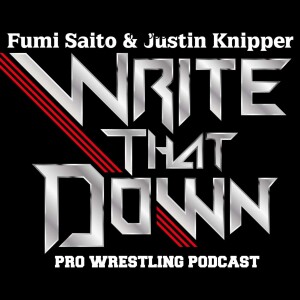
Mitsuharu Misawa. Toshiaki Kawada. Kenta Kobashi. Akira Taue. These were All Japan’s “Big Four” during of the 1990s, the four most influential players of the decade. English-speaking fans in 2021 have more and more often been referring to these four wrestlers as AJPW’s “Four Pillars of Heaven,” and recently, the term “four pillars” has turned into hip new short-hand for “top four wrestlers.”
What’s ironic about this is that “Four Pillars of Heaven” is actually a mistranslation of the word “shitennō” (四天王). In colloquial Japanese, they’re often referred to as the shitennō of AJPW. Shitennou is a common Japanese phrase to describe the top four people, places or things within a set context. In modern English, we often share our “Mt. Rushmores” of wrestlers, the top four of (fill in the blank); “shitennō” in Japanese works the same way.
So, the phrase “Four Pillars of Heaven,” which is now an accepted addition to the pro wrestling lexicon, was actually born out of a mistranslation and misinterpretation of the the original kanji characters.
Fumi Saito & Justin Knipper break this down in more detail while giving the overarching backstory behind Misawa, Kawada, Kobashi and Taue. They also discuss at length how important Stan Hansen was during this period, and how important his relationships with each AJPW shittenō were.
(Airdate 11/21)
三沢光晴 川田利明 小橋建太 田上明。これらは1990年代の全日本の「ビッグ4」であり、この10年間で最も影響力のあった4選手でした。2021年の英語圏のファンは、この4人をAJPWの "Four Pillars of Heaven "と呼ぶことが多くなり、最近では "Four Pillars "は "Top four wrestlers "の略語として使われるようになりました。
皮肉なのは、"四天王 "が "四天王 "の誤訳だということ。口語ではAJPWの四天王。四天王とは、ある文脈の中で上位4人の人、場所、物事を表す一般的な日本語の表現です。現代英語では、レスラーの「Mt.
つまり、プロレス用語として定着している「四天王」という言葉も、実は漢字の誤訳と誤読から生まれたものなのです。
フミ斎藤&ジャスティン・ニッパーが、三沢、川田、小橋、田上の裏話を交えつつ、その詳細を解説。また、この時期、スタン・ハンセンがいかに重要な存在であったか、AJPWの各選手との関係がいかに重要であったかをじっくりと論じています。
More Episodes
 2024-04-30
2024-04-30
 2024-04-08
2024-04-08
 2023-12-27
2023-12-27
 2023-12-27
2023-12-27
Create your
podcast in
minutes
- Full-featured podcast site
- Unlimited storage and bandwidth
- Comprehensive podcast stats
- Distribute to Apple Podcasts, Spotify, and more
- Make money with your podcast
It is Free
- Privacy Policy
- Cookie Policy
- Terms of Use
- Consent Preferences
- Copyright © 2015-2024 Podbean.com





